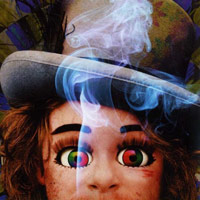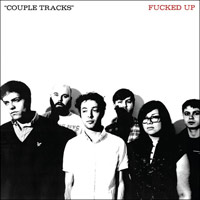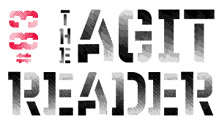
Ugly Side of Love
Domino
Much like this year’s first Agit Reader Rated Rookie, Wolf People, there’s something particularly striking about the revisionist means through which the debut from Malachai is constructed. It’s not that cratedigging has ever really fallen out of vogue, it’s just the way in which those found sounds are assembled to become new again that can be called into question. Wolf People are sampling themselves, but to that end, what they hearken back to is a lost era of mood and execution, beards and all. For Malachai, it’s quite the opposite. In an Avalanche- and/or Dust Brothers-styled cut and paste, the Bristol duo uses scraps of Britain’s rich history of invention to pepper the songs. It seems more than anywhere in the world, the UK spin out genre-centric scenes each successive week, some as progressive as they come (trip-hop and dubstep) and others that serve more as corralling magazine fodder (Britpop and garage) than a defining movement. Reflective of that history and a handful of trends, Ugly Side of Love is a mixed bag of riffs and beats, liberally using forgotten spy-movie soundtracks and rocksteady rhythms, boom bap and heavy psych, spliced and scratched to excavate the past 40 years of British music, warts and all.
Pinpointing Malachai’s strongest asset is essential to enjoying Ugly Side of Love. Portishead’s Geoff Barrow had a hand in the production, and as a result, his sonic bolstering of songs like “Snowflake” and “How Long” makes for a fairly sinister trip, the former akin to Tricky as a ’60s protest band, and the latter, simply the Kinks on a wild bender. When Malachai focus their efforts on producing the best record Kaleidoscope never made, they are, in fact, onto something quite special. “Another Sun” is arguably the record’s pop climax, in the vein of an ELO–Todd Rundgren collaboration, only anchored by an echoed boogaloo that could have only been plucked from Bristol. More often than not, though, Malachai color by number, cobbling together wonky mashes that tend to lose the dark melody and propulsion of those shining psych moments. “Blackbird” and “Only For You” are examples of Malachai concentrating on trying to dazzle with their archeological finds rather than focusing on the song at hand, and it’s ultimately that discombobulating nature that negatively affects the genre-humping unity the band is hoping to promote.
Kevin J. Elliott

Couple Tracks
Matador
Fucked Up aren’t exactly a band indecisive about itself. They’ve been acuminating their particular cast of musty, bad-breathed punk since 2001, releasing more demos, EPs, 7-inches and full-lengths than you can count on all your fingers and toes. In fact, they’re the perfect band for a singles comp. After all, with a career this prolific, it can be a little exhausting to keep up with everything. (They’ve already announced another five more releases within the next month.) Couple Tracks spans the entirety of the band’s existence, digging up some impossible-to-find limited releases in between the epochal long-players, while also throwing in a few alternate-takes and unreleased rarities to keep you guessing.
Like the rest of Fucked Up’s trade, the songs are fast, irreverent, loud, and sure to piss off your next door neighbors. The band never lets up, and takes every opportunity they can to absolutely slam on their instruments, occasionally smothering the tracks tremble-mulching, feedback miasma. And when the band does ease off, it’s only to enlarge the impact of one of frontman Pink Eyes’ concussive howls.
There’s no clear highlight out of the 25 songs, which makes sense, as they’ve all been cobbled together from the bands aforementioned absurd prolificness. Nothing on the record matches the incendiary cultivation of the unmatchable The Chemistry of Common Life, but the album isn’t trying to be that. Couple Tracks is a satisfying culmination (and a bit of a victory lap,) for one of hardcore punk’s most relevant and constantly innovative bands, and perfect for those of us who can’t always keep up with their every utterance.
Luke Winkie

Descending Shadows
Vice
Pierced Arrows’ front pirate, Fred Cole, has led numerous crews through the rough seas of the music biz for four-plus decades now. Starting out in the mid-60s, he has scrounged up gnarly nad-kicks of psych-garage, then ’70s bombast, and a punk band even. He and his soulmate, Toody, finally hammered it altogether into the grog-rock trio, Dead Moon. From the late ’80s until a few years ago, they became one of the most inspirational, if enigmatic, and completely above ground but ignored bands of the garage-punk miasma. “Big in Europe,” as they say.
The cracks in their faces and vocal chords made their age obvious, through their shows and countless records rarely relented an inch. But damn, how much more could be expected from these two, so long bashing their ears and livers on the dirt rock road? Dead Moon finally disbanded in 2006. Interviewing Cole a year later, he told me they were thinking of doing a “country thing” with their next band.
Well, if that country is a shadow-dimmed backwoods of Crime bootlegs melting Dali-like over Dead Moon’s skeleton, with only suddenly erupting bonfires giving glimpses of even darker roads ahead, then yes, this second Pierced Arrows album is a hell of a country record. For cats just past 60, Cole and Toody are not shy about shoving the vocals more upfront than even on most Dead Moon records. They both sound more snarly and mean than ever. Future shock laments like “Buried Alive” and “Onthemove” might have the grumpy mood of your grandpa pissed off at the new TV remote, but your grandpa ain’t wearing leather pants for weeks at a time while touring dives in Germany and stinging out amplified wasp-ass guitar leads over and over again. If anything, after a groping first album and now this Vice debut, Pierced Arrows is a meaner beast than latter-day Dead Moon. “Paranoia,” especially, is one of the most kicking midnight gravestone anthems Cole’s delivered yet. And Toody can still direct teary, wobbly waltzes like “Tripped Out” and “This Time Around.”
As usual, the lyrics are that odd blend of extremely blatant personal relationship waxing, body deterioration, and techno suspicion. Straining but strident like no matter what, they’ll sail into the storm winds with long locks windswept back, guitar necks aimed forward. It’s hard to find young bands who can cut through the clouds of irony and cynicism they’ve grown up on to be able to write the laser-cut lines that drip off of Cole like hooch leaking down his chin on a big swig of, well, probably water or tea by now, but it still all feels like whisky.
Eric Davidson
MP3: “Paranoia”

This Town
Hozac
Medication’s debut LP, This Town, is exactly the kind of gem Chicago-based Hozac Records is known for unearthing. The label has always been a bit of a trailblazer, and it has built a solid reputation for finding top-notch acts that are often unknowns both nationally as well as in their hometowns. In 2008, Hozac’s release of Medication’s debut 7-inch proved to be a pleasant surprise, and This Town builds on that promise.
Medication is essentially a one-man operation, with Connecticut’s Mikey Hyde writing, performing and recording the music. Hyde’s deft use of the four-track to create finely textured, dark sounds that enhance the tone of the mostly somber songs distinguishes Medication from the scores of similar projects. The overall sound evokes a feeling akin to finding dusty old photographs in an attic, and at times, it comes off as a straighter, folkier Pink Reason. The songs make the most out of their sparse instrumentation, which often only consists of a couple of guitar tracks, minimal percussion and Hyde’s haunting vocals.
The best moments on This Town come when Hyde takes advantage of his four-track mastery to darken the album’s brighter cuts. At their core, songs like “Didn’t Wanna Know” and “This Town” are fantastic pure pop songs, but built upon on great vocal melodies, come out sounding upbeat and wistful at the same time. Hyde also impresses with somber songs, such as “Sacrifice” and “Farewell Letter.”
This Town is one of the rare albums that’s a compelling listen from start to finish, and it’s almost frustrating that the record’s final track, “C’mon Girl,” cuts off abruptly. Hyde has recently assembled a full band for touring purposes, and one can only hope that the road gives him the fuel to put together some more records in the near future.
Ron Wadlinger

Back to Light
!K7
After blazing a trail as a pioneer in the field of house music with his “Beat Dis” single in 1988 and creating hits as co-producer on Neneh Cherry’s “Buffalo Stance” and Seal’s “Crazy,” Tim Simenon could have easily rested on his heels and faded into the annals of dance music history. However, the innovative producer has rarely been dormant during the past two decades, either manning the knobs for Depeche Mode, Sinead O’Connor and Björk, among others, or continuing to create music forever on the cusp as Bomb the Bass.
In many ways, “Beat Dis” was a pinnacle point in the British reinterpretation of Detroit house and American hip-hop at large. The logical next step from Public Enemy’s invasion of England and one of the archetypes of that Summer of Love’s acid house explosion, it was a latter-day equivalent to the ’60s art school extrapolations on Delta blues. Three years later, Unknown Territory seemed out of step at the time, but in retrospect turned out to be a trip-hop building block. Bomb the Bass’ releases in the intervening years—Future Chaos (1995) and Future Chaos (2008)—were more sporadic but no less esoteric. As such, Simenon’s own oeuvre was something to live up to in itself. With Back to Light, he has seemingly side-stepped the question of what to do next. With the territory into which he first ventured seemingly clear-cut, he’s now working within a subtler context. The album takes some time to warm to, but it’s probably just a matter of adjusting to its context. It’s only after two-thirds into the record—say, at (fittingly) “Start,” featuring the equally idiosyncratic Kelley Polar—that the album begins to click. This record is not so much about pushing boundaries, but rather working within the margins’ edges. This is most apparent on “Milakia,” with Martin Gore contributing. Here, all the elaborate sonic manifestations Simenon has created over the years seem to melt, draining into a pool of pure majestic pop. Simenon has proven himself just as relevant as ever, but perhaps it’s always just been a matter of how much everything else has been relevant in relation to him.
Stephen Slaybaugh
ALBUM REVIEWS
Los Campesinos, Romance Is Boring
Clipd Beaks, To Realize
Beach House, Teen Dream
Silver Swans, Realize the Ghost
Scout Niblett, The Calcination of Scout Niblett
Spoon, Transference
Surfer Blood, Astro Coast
Four Tet, There Is Love In You
Yellow Fever, Yellow Fever
Oh No Ono, Eggs
Kevin Barker, You & Me
Lindstrøm & Christabelle, Real Life Is No Cool
The Red Krayola with Art & Language, Five American Portraits
Vampire Weekend, Contra
